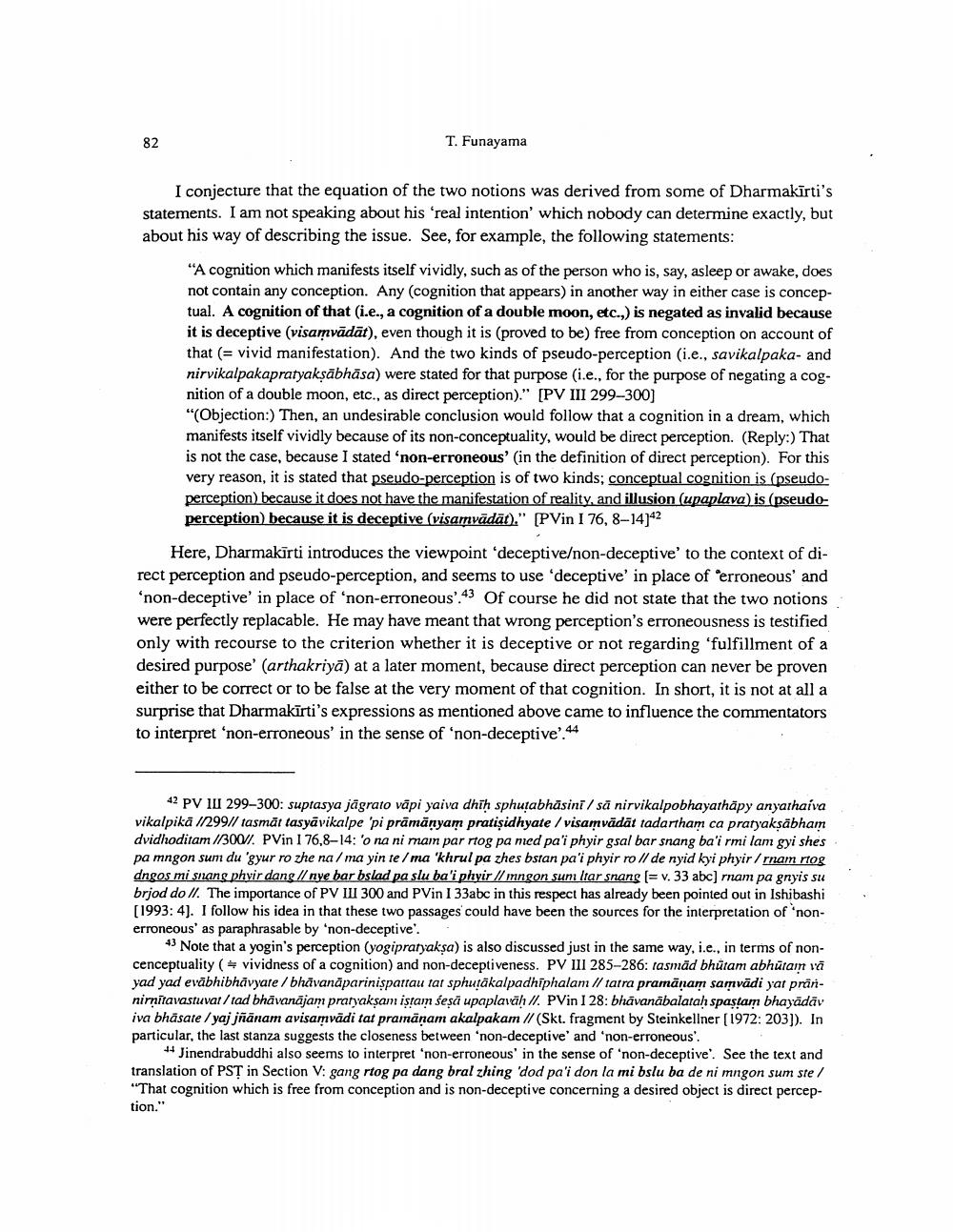________________
T. Funayama
I conjecture that the equation of the two notions was derived from some of Dharmakīrti's statements. I am not speaking about his 'real intention' which nobody can determine exactly, but about his way of describing the issue. See, for example, the following statements:
"A cognition which manifests itself vividly, such as of the person who is, say, asleep or awake, does not contain any conception. Any (cognition that appears) in another way in either case is conceptual. A cognition of that (i.e., a cognition of a double moon, etc.,) is negated as invalid because it is deceptive (visamvādāt), even though it is (proved to be free from conception on account of that (= vivid manifestation). And the two kinds of pseudo-perception (i.e., savikalpaka- and nirvikalpakapratyakşābhāsa) were stated for that purpose (i.e., for the purpose of negating a cog. nition of a double moon, etc., as direct perception)." [PV III 299-300) "(Objection:) Then, an undesirable conclusion would follow that a cognition in a dream, which manifests itself vividly because of its non-conceptuality, would be direct perception. (Reply:) That is not the case, because I stated 'non-erroneous' in the definition of direct perception). For this very reason, it is stated that pseudo-perception is of two kinds; conceptual cognition is (pseudoperception because it does not have the manifestation of reality, and illusion (upaplava) is (pseudoperception, because it is deceptive (visamvādāt)." (PVin I 76, 8-14)42
Here, Dharmakīrti introduces the viewpoint 'deceptive/non-deceptive' to the context of direct perception and pseudo-perception, and seems to use 'deceptive' in place of "erroneous' and ‘non-deceptive' in place of 'non-erroneous'.43 Of course he did not state that the two notions were perfectly replacable. He may have meant that wrong perception's erroneousness is testified only with recourse to the criterion whether it is deceptive or not regarding 'fulfillment of a desired purpose' (arthakriyā) at a later moment, because direct perception can never be proven either to be correct or to be false at the very moment of that cognition. In short, it is not at all a surprise that Dharmakīrti's expressions as mentioned above came to influence the commentators to interpret 'non-erroneous' in the sense of 'non-deceptive'.44
42 PV III 299-300: suptasya jägrato vāpi yaiva dhih sphutabhāsini / sä nirvikalpobhayathäpy anyarhaiva vikalpika //299// tasmāt tasya vikalpe 'pi pramanyam pratişidhyate / visamvādāt tadartham ca pratyaksabham dvidhoditam //30011. PVin 176,8–14: 'o na ni mam par rtog pa med pa'i phyir gsal bar snang ba'i rmi lam gyi shes pa mngon sum du 'gyur ro zhe na/ma yin te / ma 'khrul pa zhes bstan pa'i phyir ro II de nyid kyi phyir / rnam rtog dngos mi snang phyir dang // nye bar bslad pa slu ba'i phyir // mngon sum ltar snang (= v. 33 abc) ram pa gnyis su brjod do II. The importance of PV III 300 and PVin I 33abc in this respect has already been pointed out in Ishibashi (1993: 4). I follow his idea in that these two passages could have been the sources for the interpretation of nonerroneous' as paraphrasable by 'non-deceptive'.
+3 Note that a yogin's perception (yogipratyaksa) is also discussed just in the same way, i.e., in terms of noncenceptuality ( 4 vividness of a cognition) and non-deceptiveness. PV III 285-286: rasmäd bhūtam abhūtam vā yad yad evābhibhavyate / bhavanäparinisparrau tat sphutākalpadhiphalam // tarra pramānam samvādi yat prarnirnītavastuvat / tad bhāvanājam pratyaksam istam sesā upaplavāh II. PVin I 28: bhāvanabalatah spastam bhayadav iva bhäsate /yaj jñānam avisamvādi tat pramanam akalpakam // (Skt. fragment by Steinkellner (1972: 203]). In particular, the last stanza suggests the closeness between 'non-deceptive' and 'non-erroneous'.
++ Jinendrabuddhi also seems to interpret 'non-erroneous' in the sense of 'non-deceptive'. See the text and translation of PST in Section V: gang rtog pa dang bral zhing 'dod pa'i don la mi bslu ba de ni mngon sum ste / "That cognition which is free from conception and is non-deceptive concerning a desired object is direct perception."




